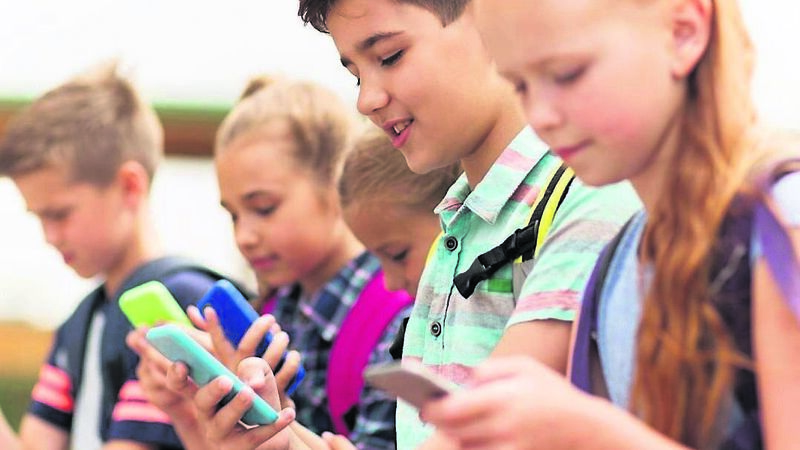Cork principal urges parents to sign up to pledge over pupils' phone use

Parents are being urged to sign a pledge against smartphone use for young children. iStock/posed
As anyone who has spent any time in the company of children will tell you, play is the language of childhood. It is how children learn about and process the world around them.
Play is so critical to their emotional, intellectual, social and physical development that it is enshrined in Article 31 of the United Nations Convention on the Rights of the Child, which recognises a child’s right to play. The Article also obliges governments to introduce any necessary legislative, administrative and other measures to protect this right.
It is a right that currently needs protecting from all sides. Many fear childhood is being steadily eroded by the advent of smartphone use among children, which is impeding on their right to learn and play and to develop at their own pace. It leaves them vulnerable and exposed to multiple risks in the unregulated online world we all now inhabit, but which our young, in particular, are not equipped to deal with, causing negative consequences for their mental health and wellbeing.
As the parent of four children ranging in age from three to 23, I have seen how apps like Snapchat have migrated from filters that gave people cute bunny ears, to embracing a dark underbelly with addictive properties driven by algorithms.
Distressing and damaging content online can include extreme violence, sexually explicit material, and unrealistic portrayals of bodies and lifestyles. Then there is the issue of online bullying, which allows bullies to follow victims around in their pockets and bedrooms.
Two years ago, the Irish Medical Organisation called for social media usage among children and young people to be treated as a public health emergency, warning that the content accessible to them is “overwhelmingly destructive”.
Daisy Greenwell, co-founder and director of Smartphone Free Childhood Ireland (Smartphonefree.ie), a parent-led drive which began in Greystones to delay smartphone and social media access until after primary school, and for as long as possible up to age 16, believes the biggest risk of smartphone devices is that they are not designed with children’s best interests in mind.
“Smartphones open the door to a world of content, interactions and addictive design features that children are not developmentally ready for - and that even adults struggle to manage,” Greenwell says. “We’re seeing growing evidence that early smartphone and social media use is linked to a rise in anxiety, poor sleep, attention issues and a loss of confidence - particularly in girls.”
Perhaps the most heartbreaking risk of all is the observation of Greenwell and many other parents and teachers that children are missing out on the chance to be fully present in their own childhoods.
“Real friendships,” says Greenwell, “creative play, long chats, curiosity, boredom, daydreaming - these are the building blocks of a healthy young mind. Smartphones crowd these things out.”
Eoin Bracken, Principal of Castletownroche National School in North Cork, is one of many educators who are keen to address the issue.
“As a principal and a parent, I have huge concerns surrounding smartphone or smart device usage,” he said.
“We’re slowly gaining a better understanding and appreciation of the implications for the current and future generations.
“Personally, I spend far too much time using my phone. They’re highly engaging and do everything we ask of them, delivering content we find highly appealing. It’s unfair and a huge ask to get young children to safely navigate the most appealing and often concerning content which is so easily available to them.”
The school has sought to remedy this by implementing a successful Accelerated Reader Programme, with daily reading sessions.
It is not enough, however, for schools to try and stem the impact of smartphones and social media alone.
Bracken has asked parents to sign up to Smartphone Free Childhood Ireland’s pledge not to purchase a smartphone for their children until they are at least of secondary school age. The idea is to have a safety in numbers approach to tackling the issue.
Bracken is realistic enough to know that, for many parents, this opportunity may have passed them by. “But I am hopeful all incoming families will consider this going forward. We’ve got to start somewhere and cannot change the world overnight, however, it’s healthy to have parents much more aware that we have to be proactive in the face of such challenges.”
Greenwall says schools can be crucial allies in the movement to keep children’s lives smartphone-free.
“When schools take a clear, thoughtful stance on smartphones, it gives parents the confidence to hold the line at home. It levels the playing field, reduces peer pressure, and creates a shared sense of community values.”
A sense of community has long been one of Ireland’s core strengths. Ireland knows how to come together, support each other and care for its vulnerable members. It does this every time someone passes away.
It is a difficult, highly pressurised time to be a parent, and parents need to support each other. There is no manual or dress rehearsal, when it comes to raising children. What would Greenwell advise parents who may be unsure about signing the smartphone-free pledge?
“We know this isn’t an easy decision,” she notes, “and we always come from a place of empathy, not judgement. To any parent unsure, I’d say: if something doesn’t feel right about smartphones and childhood, you’re not imagining it. You’re not alone - and you do have a choice.
“The pact isn’t about cutting kids off from the world. It’s about protecting their wellbeing while they’re still developing, and helping them build resilience, relationships and offline experiences that are vital in the long-run. And the unexpected upside? Your child not having a smartphone actually makes your life easier. You don’t have to worry about what they’re seeing and experiencing online.”
It is about putting the child back into childhood, where they are meant to be.







 App?
App?




